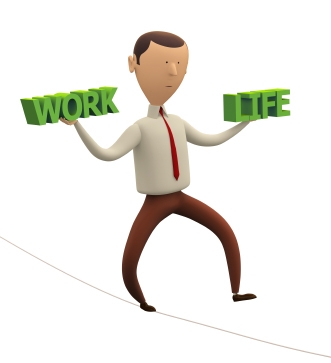Like many preschool children, the daughters of Dr. Robert Min would eagerly bring home crayon portraits of the family they drew for mom and dad to look at. And in those pictures, Dr. Min could see his daughters — Olivia and Samantha — as well as his wife, a physician herself.
Dad, however, was nowhere to be found.
"'Daddy's at work,' they told me when I asked why I wasn't in the pictures," said Dr. Min, chairman of the Department of Radiology and radiologist-in-chief at NewYork-Presbyterian Hospital/Weill Cornell Medical Center.

To make up for his absence, Dr. Min bought his daughters a dog. And sure enough, when the family pictures starting coming home, a new face had made an appearance: the dog.
At 45, Dr. Min has reached a level of professional success that few in his field will ever approach. But he shares a common burden with almost every other physician, researcher and clinician at Weill Cornell and beyond. How do you balance the responsibilities of a demanding profession while maintaining a healthy personal and family life?
"It's very easy to find someone who is academically and clinically productive. What's hard is finding someone who is both, and has a life and is a happy person," said Dr. Rache Simmons, the Anne K. and Edwin C. Weiskopf Professor of Surgical Oncology at Weill Cornell Medical College.
On March 15, Dr. Simmons hosted a lecture on achieving that elusive balance, featuring the personal stories of four Weill Cornell physicians.
Dr. Holly Andersen, who like Dr. Min has two children and a dog at home, said that the kind of person who is successful in a field such as medicine is often unaware that his or her life is out of balance.
"We are so good at keeping our heads down, at working hard and jumping through whatever hoop they put in front us, that when we do lift our heads up and take a look around, we realize we don't know where we are going," said Dr. Andersen, associate professor of clinical medicine at Weill Cornell.
Left unchecked, that work ethic can consume one's entire life, freezing out family and loved ones, and even negatively impacting the very work they are so immersed in.
"Setting time limits for different tasks helps ensure that you don't end up wasting three hours on something that should take 10 minutes," said Dr. Lorraine Gudas, who, in addition to her duties as chairman of the Department of Pharmacology, also writes grant proposals, mentors postdoctoral students in her lab, and guides research.
Dr. Shari Midoneck, who was recently named Associate Dean of Academic Affairs, said living close to her office has all but eliminated her commute. The saved time means an extra hour or two of helping with her kids' homework or making them dinner.
To varying degrees, it is difficult to control where you live or what your hours are. What you can control, the speakers stressed, is your workload, and the golden rule there is learning to say no.
While at Harvard, Dr. Gudas was asked by the president of Dana Farber Cancer Institute to manage a prestigious lecture series — which duties included booking speakers, arranging for travel and accommodations, and so on. Without administrative support, Dr. Gudas knew this added responsibility would overwhelm her. So she said she couldn't take on the seminars, not without help. The president of Dana Farber quickly called in his own administrative assistant and assigned her to Dr. Gudas.
"If there is help available to you when it comes to a new responsibility or duty, take that help," Dr. Gudas said.
Developing a strong relationship with one's supervisor helps manage inevitable difficulties that arrive with new responsibilities.
At home, many of the same methods that allow for a productive work day — setting aside specific time for certain tasks — can also be put to good use.
Dr. Min has a "date night" with his wife once a week and enters Wiffle ball tournaments with his family.
But to make time for that, something else must be sacrificed. Lately, it's been contributing book chapters.
"There is no one balance," Dr. Min said. "It's a continuous process of setting your priorities, maintaining them and then looking at them again every so often to see if anything has changed."

